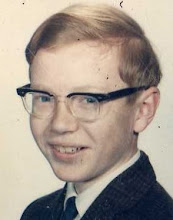Something was wrong that's for sure. They expected students to study three hours a night. What? I'm only 13! Half an hour a night, maybe. I just didn't have the metabolism for it. What is the urgency? (Since become a lifelong refrain.) Why are we racing through the curriculum? Let's take a break. Can we go over that again?
The boys of OC 1 were bright and aggressive little snots, used to being smarter than most. I fell behind in all subjects almost immediately, most perilously in Algebra and French which were difficult, and Religion which, I'm saying to myself, are you kidding with this stuff! Didn't we do enough already with the nuns?
Poor performance by a student reflected poorly on the selection criteria. The task of determining the cause of my floundering fell to Brother Linus. Beloved by all right-thinking students, he taught freshman Religion (I was in his class), coached the hockey team and was a guidance counselor. There was no escaping this guy and of course as a loser, I couldn't stand him nor he me.
One of the few things I got right on a Religion test (the very idea is appalling) was a matching question--A. Spilled his seed. Q. Onan. Thus "onanism" which was one of the few fields of study I was motivated to apply myself to for the recommended time. Beyond that I just couldn't manage my Bible facts whose study struck me as a mental exercise similar to and slightly less satisfying than counting the number of holes in each ceiling tile in the classroom.
Oddly enough I had no trouble memorizing years of Catechism back at St Pius's. Apparently I had achieved sentience in the meantime.
So beloved Brother Linus in his role as guidance counselor called me into his office, in an effort to understand this gawky dork of a kid who wouldn't learn his Bible facts, who had pimples and thick glasses and probably wasn't interested in sports. In short, not made of the right Catholic boy stuff.
Nevertheless he puffed on a pipe whose sweet aroma he probably thought was soothing to the troubled lads. Put them at their ease, so they would open up, such that he might get a peek into their... paltry little psyches. Oh Brother, let me reveal myself unto you!
 Brother Linus leaned back in his chair, drew on his pretentious utensil of comfort and, inadvertently channeling the not-yet-existent Bob the SubGenius, fixed me with his best patronizing and wise look and asked,
Brother Linus leaned back in his chair, drew on his pretentious utensil of comfort and, inadvertently channeling the not-yet-existent Bob the SubGenius, fixed me with his best patronizing and wise look and asked,"Well Mr. Keefe, is there anything troubling you--anything on your mind?"
Though not yet able to articulate for this beloved Brother the SubGenius doctrine of Slack, I was not too young for self analysis, and was aware enough of the sources of my misery. But I wasn't about to tell him, being part of the problem, after all! Smug Catholic prick, secure in his musky status quo, surrounded by his well-adjusted boy soldiers, who gave the likes of him their unquestioning loyalty, in return for a secure place in the Papist army.
Was that Old Spice I smelled, beneath the Cherry Blend tobacco?
The little atheist-to-be can not but squirm under the brutal thumb of his Inquisitor and after leaving his office squirm still more under the brutal thumbs of his young minions!
Another Brother gave me an IQ test, to be sure they hadn't made a horrible mistake. He asked me the population of the US and I said 200 million, which was pretty good for '67 I think. I also knew the capital of Bananistan, and that Bolivia exported tin, but he didn't ask about them. He did ask if I knew what audacious meant and I said it means chutzpah. I didn't mean to be a wisenheimer in that particular case, but couldn't think of any other word and anyway he ought to know from Mad magazine.
So at the end of freshman year my parents received a nice handwritten letter, in wobbly fountain penmanship, from Headmaster Brother Ricardo informing them of my fate. Expelled! Such is the lot of the Catholic shmendrik. Darn the luck. But wait!
My mother wrote back and said that her son had been unable to concentrate due to his distress over her medical condition. I had no idea she had a medical condition and probably wouldn't have noticed if she did. Anyway she didn't have one--she was fine. She had gone into the hospital briefly for a hysterectomy, described to me by my aunts as "a women's plumbing problem"--uck, that was as much detail as I wanted to know, and I never gave it a moment's thought.
Being wise in the ways of the One True Holy Catholic and Apostolic Church she also enclosed a check, and after a few weeks in Lynn summer school doing long division and typing with the other retards, I was back the next fall, in OC 3 whose kids weren't quite as smart and with whom I could keep up, with my customary study habits.
Years later I learned that beloved Brother Linus died from falling down a flight of stairs at the school. I didn't feel glad about it like a bitter person might, though I do have the urge from time to time to deduce meaning from the ridiculousness of the manner of his demise. As yet, to no avail.



